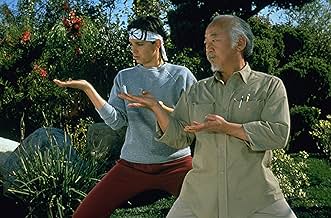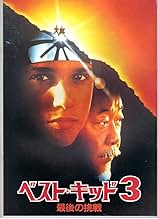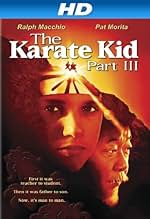John Kreese intenta vengarse de Daniel y Miyagi, con la ayuda de un amigo de la guerra de Vietnam.John Kreese intenta vengarse de Daniel y Miyagi, con la ayuda de un amigo de la guerra de Vietnam.John Kreese intenta vengarse de Daniel y Miyagi, con la ayuda de un amigo de la guerra de Vietnam.
- Premios
- 5 nominaciones en total
Pat Morita
- Mr. Miyagi
- (as Noriyuki 'Pat' Morita)
William Christopher Ford
- Dennis
- (as Christopher Paul Ford)
Resumen
Reviewers say 'The Karate Kid Part III' is criticized for its repetitive plot and less compelling characters, particularly Daniel and Mr. Miyagi. The villains are deemed over-the-top and lacking depth. Despite these issues, some appreciate its nostalgic value and the duo's dynamic. Action sequences receive mixed reviews, with praise for intensity but criticism for lack of innovation. Overall, it is considered a weaker installment, failing to match the original's impact.
Opiniones destacadas
Having enjoyed the first two films, I wanted to see this film too. While not particularly brilliant, I do think it is better than people make it out to be. The script is weak, the plot predictable and the villains unbelievable with somewhat unrealistic motives. However, it did move fairly briskly, had some neat direction, it looked good, the karate sequences were efficient and well choreographed, the ending was decent and there is some nice messaging. I have liked the character of Miyagi as well, he strikes me as wise and caring, the sort of character I like. The acting also was not too bad, Ralph Macchio once again is appealing while Pat Morita, who is always watchable, gives another solid performance. Overall, it was decent, while nothing exceptional. 6/10 Bethany Cox
I have to say, every time I watch Karate Kid III, I laugh many, many times. Trouble is...it's not intentionally a comedy! That's okay with me though, I still watch it every time I catch it on cable. It's definitely a "so bad, it's good" movie. Ralph Macchio isn't a great actor, but Robin Lively was terrible in her role as the supposed love-interest...which only made it better in my eyes. The dialogue was corny, over-the-top, and oh-so unnatural. Brilliant!
I sincerely liked the first KK, was bored by the second one, but KK III is definitely my favorite. It's poorly-made, poorly-acted, and poorly-written. And I loved every minute of it.
I sincerely liked the first KK, was bored by the second one, but KK III is definitely my favorite. It's poorly-made, poorly-acted, and poorly-written. And I loved every minute of it.
The Karate Kid, Part III、as the title suggests, is the third film in the Karate Kid film series, released in 1989, directed by John Avlidsen, and starring Ralph Macchio as Daniel and Pat Morita as Mr. Miyagi. The Karate Kid film series is a rather typical example of other 1980s film series (such as Robocop) which just run out of steam as time goes on to the extent that they began with a bang and ended with a whimper. Despite its flaws however, The Karate Kid, Part III isn't nearly as bad as some people make it out to be and is certainly no Robocop 3. This review will discuss the problems with the movie as well as what it gets right, with an overall assessment of the Karate Kid original film series as a whole.
One of the biggest problems with this movie is the lack of continuity with the Karate Kid Part II, which for all its flaws did genuinely advance the story and develop Daniel and Miyagi's character. The film is fairly graceless in its dumping of Daniel's love interest Kumiko; it's explained that she just got a job in Japan that she couldn't turn down. This just didn't strike me as believable, perhaps because they had done it before in Part II. Daniel's relationships always happen to end between films? It's frankly insulting when sequels hit the reset button like this.
But the real continuity problem is one that is never addressed at all, and that is the relationship between Yuki and Miyagi. This is not presented as a mere superficial teenage romance, but instead as true love. Miyagi even says that he would stay in Okinawa, if not for the people trying to kill him. So why doesn't Miyagi stay in Okinawa after the conclusion of Part II, or take Yuki to America? It's never explained. This film takes a dump on Miyagi and Daniel's development; the second film may as well have never happened.
Moreover, all the balance and self-control that Daniel developed in the first two films is gone, indeed Daniel if anything seems even more neurotic and unbalanced than he was at the beginning of the original film. Daniel is whiny and angsty, going into long diatribes about his own inadequacy. This would be less irksome if it were a response to something far more drastic; but in Part II the villains were trying to kill him and his master; in Part III they are just trying to take away his title as champion by defeating him in a local karate tournament. So, Daniel is cool-headed when threatened with death in a foreign land, but the prospect of losing his title to a bunch of local punks turns him into a nervous wreck? The film also fails to find a coherent theme, besides poorly retreading the original.
That said, the film does manage to get some things right. As whiny as Daniel is, he retains something of his likability, even if it is diminished. We also have the things that make the whole series fun; wonderfully over-the-top villains and pseudo-eastern wisdom. The emotional core of the film is tarnished but intact; that of the relationship between Daniel and Miyagi. These two characters, although somewhat botched, still work together well.
None of the original Karate Kid films are by themselves incoherent, but taken as a whole the series is rather lopsided. They do get progressively worse as the series goes on, and by the end of Part III one is glad they never made a fourth film (unless you count the Next Karate Kid, and I don't). Still, while it's a shame that they never managed to quite recapture the magic of the first film, I'm glad I got to spend 3 films in the company of these terrific characters.
One of the biggest problems with this movie is the lack of continuity with the Karate Kid Part II, which for all its flaws did genuinely advance the story and develop Daniel and Miyagi's character. The film is fairly graceless in its dumping of Daniel's love interest Kumiko; it's explained that she just got a job in Japan that she couldn't turn down. This just didn't strike me as believable, perhaps because they had done it before in Part II. Daniel's relationships always happen to end between films? It's frankly insulting when sequels hit the reset button like this.
But the real continuity problem is one that is never addressed at all, and that is the relationship between Yuki and Miyagi. This is not presented as a mere superficial teenage romance, but instead as true love. Miyagi even says that he would stay in Okinawa, if not for the people trying to kill him. So why doesn't Miyagi stay in Okinawa after the conclusion of Part II, or take Yuki to America? It's never explained. This film takes a dump on Miyagi and Daniel's development; the second film may as well have never happened.
Moreover, all the balance and self-control that Daniel developed in the first two films is gone, indeed Daniel if anything seems even more neurotic and unbalanced than he was at the beginning of the original film. Daniel is whiny and angsty, going into long diatribes about his own inadequacy. This would be less irksome if it were a response to something far more drastic; but in Part II the villains were trying to kill him and his master; in Part III they are just trying to take away his title as champion by defeating him in a local karate tournament. So, Daniel is cool-headed when threatened with death in a foreign land, but the prospect of losing his title to a bunch of local punks turns him into a nervous wreck? The film also fails to find a coherent theme, besides poorly retreading the original.
That said, the film does manage to get some things right. As whiny as Daniel is, he retains something of his likability, even if it is diminished. We also have the things that make the whole series fun; wonderfully over-the-top villains and pseudo-eastern wisdom. The emotional core of the film is tarnished but intact; that of the relationship between Daniel and Miyagi. These two characters, although somewhat botched, still work together well.
None of the original Karate Kid films are by themselves incoherent, but taken as a whole the series is rather lopsided. They do get progressively worse as the series goes on, and by the end of Part III one is glad they never made a fourth film (unless you count the Next Karate Kid, and I don't). Still, while it's a shame that they never managed to quite recapture the magic of the first film, I'm glad I got to spend 3 films in the company of these terrific characters.
Rumor has it Tom Cruise was offered the chance to reprise his signature '80s role in two (!) Top Gun sequels, but refused because he didn't want to do the same thing over and over. He has a point: some films, like Star Wars or Indiana Jones (even Rocky or Rambo, to a reasonable extent), can and in fact deserve to have follow-ups, because the people who made them genuinely think there is more to tell about those characters (Rocky V is too much, though); others, like Top Gun or The Karate Kid, are crippled from the beginning by the fact that they are indelibly connected to the decade that spawned them, and also suffer from having fairly basic scripts and characters that wouldn't really benefit from any continuation of the story. Sadly, Ralph Macchio never realized this, and so here we are: The Karate Kid, Part III.
Whereas the first film dealt with a recycled subject (young boy gets revenge on those who humiliated him) from a new angle, Part III resurrects the revenge theme with all its clichés. The "driving force" (assuming there is one) of the screenplay (if you can call it that) is John Kreese (Martin Kove), the sadistic karate teacher whose students got their asses kicked by Daniel Larusso (Macchio). Broke and lonely, Kreese decides to ask an old army buddy, Terry Silver (Thomas Ian Griffith), to help carry out a diabolical plan that will make Daniel and Mr. Miyagi (Pat Morita) suffer like never before. Getting them to fight back, however, will prove harder than usual, as Miyagi is more interested in opening a bonsai shop and Daniel refuses to act violently since he is - what a surprise, this - in love.
Love, vengeance, honor, blood and gratuitous butt-kicking are all thrown in the mix, though hardly any of them work to full effect. As a matter of fact, the more explicit violence suffocates the franchise's trademark comedy bits, leaving a few underwhelming Daniel/Miyagi moments with the duty of lightening the tone. Even worse, though, is the over-the-top behavior of the villains: Griffith does nothing but stare manically, shout and laugh, while Kove, who was funny in the first installment of the series, transforms Kreese into a grotesque parody of his earlier work. Only when the dead-certain final battle arrives, there is a sense of the trilogy regaining whatever it lost from Part II onwards. But the question remains: how many people will still be paying attention at that point?
Whereas the first film dealt with a recycled subject (young boy gets revenge on those who humiliated him) from a new angle, Part III resurrects the revenge theme with all its clichés. The "driving force" (assuming there is one) of the screenplay (if you can call it that) is John Kreese (Martin Kove), the sadistic karate teacher whose students got their asses kicked by Daniel Larusso (Macchio). Broke and lonely, Kreese decides to ask an old army buddy, Terry Silver (Thomas Ian Griffith), to help carry out a diabolical plan that will make Daniel and Mr. Miyagi (Pat Morita) suffer like never before. Getting them to fight back, however, will prove harder than usual, as Miyagi is more interested in opening a bonsai shop and Daniel refuses to act violently since he is - what a surprise, this - in love.
Love, vengeance, honor, blood and gratuitous butt-kicking are all thrown in the mix, though hardly any of them work to full effect. As a matter of fact, the more explicit violence suffocates the franchise's trademark comedy bits, leaving a few underwhelming Daniel/Miyagi moments with the duty of lightening the tone. Even worse, though, is the over-the-top behavior of the villains: Griffith does nothing but stare manically, shout and laugh, while Kove, who was funny in the first installment of the series, transforms Kreese into a grotesque parody of his earlier work. Only when the dead-certain final battle arrives, there is a sense of the trilogy regaining whatever it lost from Part II onwards. But the question remains: how many people will still be paying attention at that point?
After returning from Japan, Mr. Miyagi & Daniel(Pat Morita & Ralph Macchio again) try to settle in to their lives, only to have old foe John Creese(Martin Kove) return seeking revenge after losing his students, his school, and his money. He turns to grateful Vietnam veteran buddy Terry Silver(Thomas Ian Griffith) to help him regain what he lost, and punish Miyagi and Daniel.
A great pity this is such a comic book level script, with over-the-top villainy(at one point, both Creese and Silver laugh at Miyagi & Daniel like they're the Joker and Riddler!) and redundant character development(Did Daniel learn nothing from the first two films?) Only Pat Morita keeps this disappointment from complete ruin, with his fine performance(he looks appropriately weary of it all!) Ending is predictable, but too abrupt, leaving loose ends never tied up.
A great pity this is such a comic book level script, with over-the-top villainy(at one point, both Creese and Silver laugh at Miyagi & Daniel like they're the Joker and Riddler!) and redundant character development(Did Daniel learn nothing from the first two films?) Only Pat Morita keeps this disappointment from complete ruin, with his fine performance(he looks appropriately weary of it all!) Ending is predictable, but too abrupt, leaving loose ends never tied up.
¿Sabías que…?
- TriviaRalph Macchio's character was supposed to have a romantic relationship with the character of Jessica (played by Robyn Lively) but he asked to have their relationship be platonic because he didn't want his wife to be jealous. In addition, the age difference was uncomfortable for all involved. As Macchio was 27 during filming and Lively a minor at just 16.
- ErroresWhen Terry Silver and Daniel are in the Cobra Kai dojo for the first time together and Daniel is attempting to sweep the "knee" of the wooden dummy, the wood is solid and he cannot break it. As Terry Silver prepares to demonstrate the move, a break in the wood of the first leg is plainly visible. Sure enough, that's where his foot makes contact and the wood falls apart. A break in the torso, where he hits it, is similarly visible.
- Citas
Mr. Kesuke Miyagi: Inside you same place you karate come from.
Daniel Larusso: My karate comes from you.
Mr. Kesuke Miyagi: Ah. Only root karate come from Miyagi. Just like bonsai choose own way grow because root strong, you choose own way do karate same reason.
Daniel Larusso: I do it your way.
Mr. Kesuke Miyagi: Hai. One day, you do own way.
- Créditos curiosos"The Karate Kid family will miss Our Dear Friend, Jimmy Crabe".
Selecciones populares
Inicia sesión para calificar y agrega a la lista de videos para obtener recomendaciones personalizadas
Detalles
- Fecha de lanzamiento
- País de origen
- Idioma
- También se conoce como
- El Karate Kid, parte 3
- Locaciones de filmación
- Ennis House - 2607 Glendower Avenue, Los Feliz, Los Ángeles, California, Estados Unidos(Terry Silver's house)
- Productoras
- Ver más créditos de la compañía en IMDbPro
Taquilla
- Presupuesto
- USD 12,500,000 (estimado)
- Total en EE. UU. y Canadá
- USD 38,956,288
- Fin de semana de estreno en EE. UU. y Canadá
- USD 10,364,544
- 2 jul 1989
- Total a nivel mundial
- USD 38,956,288
- Tiempo de ejecución1 hora 52 minutos
- Color
- Mezcla de sonido
- Relación de aspecto
- 1.85 : 1
Contribuir a esta página
Sugiere una edición o agrega el contenido que falta

Principales brechas de datos
By what name was El Karate Kid, parte III: el desafío final (1989) officially released in Australia?
Responda



































